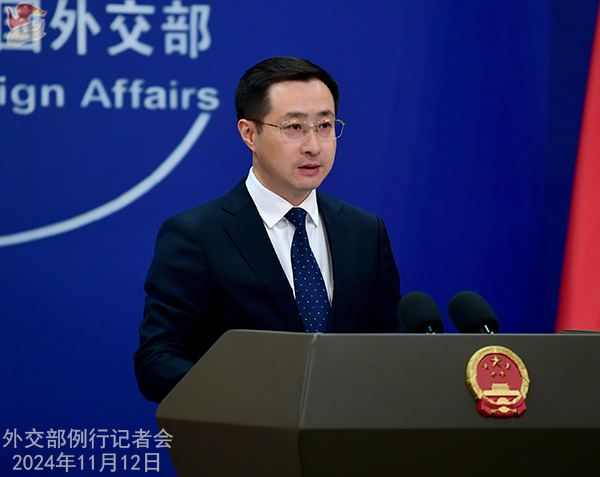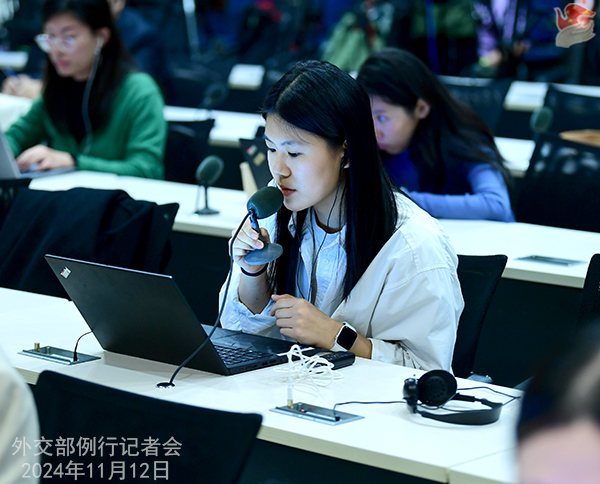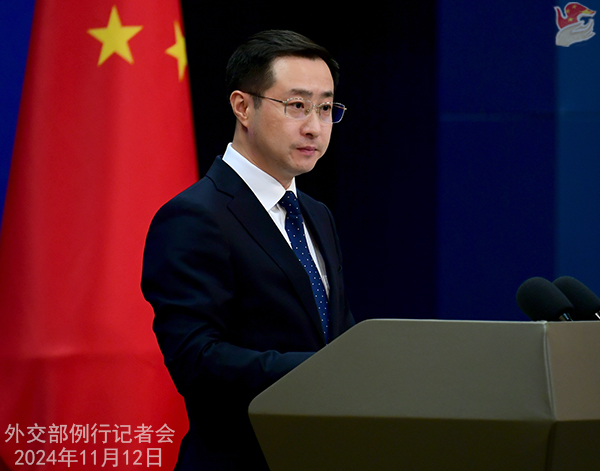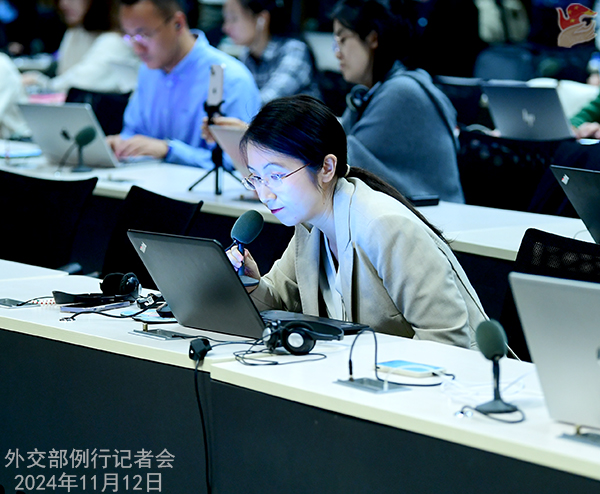
People’s Republic of China


CRI: China announced last week that President Xi Jinping will visit Latin America. This year marks the 10th anniversary of President Xi Jinping’s proposal of China and Latin America and the Caribbean (LAC) building a China-LAC community with a shared future and common progress. What progress has been made in building a China-LAC community with a shared future over the past decade?
Lin Jian: Over the past decade, President Xi Jinping’s proposal of building a China-LAC community with a shared future has been translated from a vision to action and from a blueprint to reality. The proposal has generated fruitful outcomes, benefited the two peoples and is widely welcomed by LAC countries.
China and LAC hold high the banner of peaceful development and cooperation, forge stronger synergy between each other’s development strategies, upgrade and accelerate cooperation and share the outcomes of cooperation. Both sides uphold true multilateralism and work for more just and equitable global governance. China and Brazil jointly issued six common understandings on the political settlement of the Ukraine crisis and launched the Group of Friends for Peace on the Ukraine crisis together with other like-minded Global South countries to build global synergy on deescalating the situation. China is the second largest trading partner for the region and the largest trading partner for many countries in the region. China has signed free trade agreement with five countries and engaged in high-quality Belt and Road cooperation with 22 countries in this region. The cooperation between the two sides has been expanded from traditional areas including economy and trade, finance and infrastructure to such emerging areas as energy, digital economy and aerospace. The direct flights between China and LAC have become an “Air Silk Road”. China has actively provided human resources training programs to LAC, sent medical and agricultural experts there and promoted “small yet smart” livelihood programs on growing bamboos and Juncao to boost development and revitalization in the region.
China is always a trustworthy friend and partner to LAC countries and their peoples. The China-LAC relationship has entered a new era characterized by equality, mutual benefit, innovation, openness and more benefits for the people. President Xi Jinping will soon pay another visit to Latin America, which will be his sixth visit to the region since 2013. We believe under the guidance of heads-of-state diplomacy, the China-LAC community with a shared future will enjoy more promising prospects in the next decade.
Dragon TV: The seventh China International Import Expo (CIIE) concluded in Shanghai a few days ago. The CIIE produced fruitful results, reaching US$80.01 billion worth of tentative deals for one-year purchases, up by 2 percent from the previous CIIE. What’s your comment on the achievements and significance of the seventh CIIE?
Lin Jian: The China International Import Expo (CIIE) is a fine example of China expanding high-standard opening up and sharing its development dividends with the rest of the world. Within six days, 77 countries and international organizations participated in the country exhibition and exhibitors from 129 countries and regions took part in the business exhibition. The number of participating Fortune Global 500 companies and industry leaders reached 297. Over 450 new products, new technologies and new services were unveiled. The CIIE provided over 120 free booths for 37 least developed countries, including those from Africa, as part of the concrete actions to help more developing countries board the express train of China’s development and engage in the process of economic globalization.
China is firmly resolved and confident in driving the opening up and common development of the world through its high-standard opening up and high-quality development. We stand ready to work with other parties to build an open global economy, make economic globalization more open, inclusive, balanced, and beneficial for all, and deliver more benefits of development to the people across the world in a more equitable way.
CCTV: It’s reported that President Xi Jinping sent a reply letter to friendly personages in Brazil, which received warm response. Those committed to China-Brazil friendship in Brazil said that President Xi Jinping’s letter injected new impetus for Brazil-China friendship and the growth of bilateral ties. Can you share more details on that?
Lin Jian: President Xi Jinping recently replied to letters from over 100 friendly personages from Brazil, including Enrique Teixeira, former deputy mayor of Campinas, São Paulo State, the Brazil-China Friendship Association, teachers and students from the University of São Paulo and São Paulo State University, and the Copacabana Fort Orchestra in Rio de Janeiro, encouraging them to continue to contribute to China-Brazil friendship. The letter received extensive and positive response. People from all walks of life committed to China-Brazil friendship in Brazil said that they are deeply inspired by the letter, look forward to President Xi Jinping’s visit to Brazil and stand ready to make further contribution to deepening Brazil-China friendship.
China and Brazil enjoy time-honored friendship that is ever-flowing like the Yangtze River and the Amazon River and that has brought the two countries close together despite being thousands of miles apart geographically. About 200 years ago, the first group of Chinese tea farmers traveled across the ocean to grow and teach the art of tea in Brazil. The seed of friendship they sowed back then has grown tall and borne fruit. The friendship between the people has always been a source of driving forces for the growth of China-Brazil relations. We believe that President Xi Jinping’s upcoming state visit to Brazil will further strengthen the bond of cultural and people-to-people exchanges between the two countries and write a new chapter of China-Brazil friendship that surmounts mountains and oceans. We welcome more Brazilian friends to visit China and experience the vibrancy of Chinese modernization.

Reuters: Regarding Philippine Defence Minister Gilberto Teodoro, he said today that China is putting ever greater pressure on the Philippines to concede sovereign rights in the South China Sea, adding that the Philippines was, in his words, a victim of Chinese aggression. Does China have a response to this?
Lin Jian: You mentioned the remarks of the relevant person in the Philippines. Let me point out that every escalation of maritime disputes between China and the Philippines was triggered by the infringement activities and provocations of the Philippines. It was the Philippines who took infringement activities first and China had to take necessary measures in accordance with law to safeguard our lawful rights and interests. If the Philippines stops infringement activities and provocations, there will be no trouble at sea.
Xinhua News Agency: Yesterday the Xi Jinping Thought on Diplomacy Studies Centre and China Institute of International Studies held an event to release the Report on the True Multilateralism. The report pointed out that in a world fraught with transformation and instability, true multilateralism is a must choice for mankind to address global challenges and improve the global governance system. Can you share more details with us?
Lin Jian: Yesterday afternoon, the Xi Jinping Thought on Diplomacy Studies Centre and China Institute of International Studies held an event to release the Report on the True Multilateralism: Conceptual Development, Core Essence and China’s Practice. In April 2021, President Xi Jinping advocated the vision of “true multilateralism” in his keynote speech at the Boao Forum for Asia Annual Conference. Over the past three years and more, this vision has received increasing and extensive support from various countries, effectively boosted solidarity and cooperation of the international community, and proved to be highly relevant to our times and important for our practice. The report took stock of the essence of the important vision and its practice, and provides useful references for us to continue upholding and practicing true multilateralism.
To advance the implementation of the vision of true multilateralism, we need to extensively pool wisdom and strength of all sides. We support think tanks in China in making greater contribution in this regard. China also stands ready to work with countries around the world to hold high the banner of true multilateralism, advocate fairness, justice, openness and inclusiveness, act on the principle of extensive consultation, joint contribution and shared benefit, uphold the purposes and principles of the UN Charter, and make new contribution to building an open, inclusive, clean and beautiful world that enjoys lasting peace, universal security, and common prosperity.
Beijing Daily: According to media reports, Pravind Jugnauth, the incumbent Prime Minister of Mauritius, has conceded defeat in the parliamentary election in an interview on November 11. Navin Ramgoolam, the leader of the Alliance for Change, will take over the post of prime minister for a fourth time. Do you have any comment?
Lin Jian: We noted relevant reports. We congratulate Mr. Navin Ramgoolam on his election as the Prime Minister of Mauritius and believe that under his leadership, Mauritius will achieve greater success on the path of its national development.
China and Mauritius share profound traditional friendship and fruitful outcomes of practical cooperation, which brings huge benefits to the two peoples. Prime Minister Navin Ramgoolam is an old friend of the Chinese people who has paid several visits to China. China stands ready to work with the new administration of Mauritius and take the implementation of the outcomes of the FOCAC Beijing Summit as an opportunity to strive for greater development of the strategic partnership between the two countries.

Bloomberg: A deputy German economy minister is in Taiwan this week for talks with officials there and executives. He’ll also visit TSMC. Does the Foreign Ministry want to comment on this visit?
Lin Jian: There is but one China in the world, and Taiwan is an inalienable part of China’s territory. The one-China principle is a universally recognized norm in international relations and a prevailing consensus in the international community as well as the political foundation of China-Germany relations. We urge Germany to abide by the one-China principle, stop official exchange with Taiwan authorities in whatever form, and stop sending wrong signals to the separatist forces for “Taiwan independence.”
Reuters: What is China’s expectation for the APEC summit this week? Is President Xi Jinping planning to meet President Biden on the sidelines of the summit?
Lin Jian: On your first question, President Xi Jinping’s attendance at this year’s APEC Economic Leaders’ Meeting is an important action of China’s heads-of-state diplomacy facing the Asia-Pacific, which fully shows the high importance China attaches to Asia-Pacific economic cooperation. In a world struggling to find drivers for growth, regional economic cooperation in the Asia-Pacific faces new challenges. APEC is an important platform for economic cooperation in the Asia-Pacific, and this region is expected to continue to play its role as a dynamic engine for world economic growth. President Xi Jinping will deliver an important speech at the meeting to elaborate on China’s important measures to deepen reform and opening up and propositions on advancing Asia-Pacific cooperation. China stands ready to work with other parties to deliver on the APEC Putrajaya Vision 2040 in an all-round and balanced way, strive for positive outcomes of this meeting, provide new impetus for advancing regional economic integration and promoting the growth of Asia-Pacific and the rest of the world, and jointly build an Asia-Pacific community with a shared future.
On your second question, I have no information to share.
AFP: Earlier today, Wang Yi met with Russian Security Council Secretary Sergei Shoigu. Can the Foreign Ministry provide details on what was discussed at that meeting?
Lin Jian: We will release information in due course. Please check back for updates.
AFP: North Korea and Russia have ratified their defense treaty, requiring both sides to provide military assistance without delay. Does China have any comment on the cementing of military cooperation between the two sides?
Lin Jian: On the bilateral exchange and cooperation between the DPRK and Russia, we have made clear our position more than once. The DPRK and Russia are two independent sovereign states. How to develop their bilateral relations is a matter for themselves.




